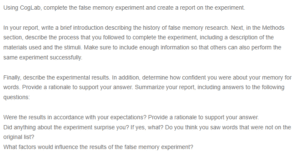The False Memory Experiment
Memory is the process of acquiring and retaining information. The hallmark of human memory is the ability to preserve and retrieve encoded information. While retrieving information is not flawless, and people tend to forget, forgetting encoded information may signal a pathological condition. Notwithstanding, the quality of memory maintains significance in many life processes. False memory details scenarios in which individuals recollect events that never occurred or are different from how they happened (Greene & Murphy, 2020). Coined by Elizabeth Loftus, this phenomenon occurs when an individual who has experienced an event is given another piece of information that contorts the original memory (Wagner et al., 2022). This report will cover an experiment on false memory, which demonstrates biases in retrieving information.
Methodology
The experiment was conducted using CogLab. A sequence of words was displayed on the trial window, one at a time, with each word displayed for one and a half seconds. The response button then appeared with words from the trial window. The participants are expected to recall words using the response button displayed in the trial window. The dependent variable in this experiment is the percentage of each word sequence recalled in the response tab, while the independent variables include the words presented in the trial window and related and unrelated distractors.
Results
A total of 6 trials were attempted. In each trial, there was one unrelated distractor, eight related distractors, and seven words related to the word sequence in the trial window. The percentage recall for items in the trial window was 69%. The percentage recall for related distractors was 4%, while the percentage recall for unrelated distractors was 0%.
Discussion
The percentile for related words was relatively higher than the values for unrelated and related distractors. This is the expected finding. In the experiment, the words presented were related to the distractors, driving the participants to think the distractor item was among the words shown. This is the hallmark of the false memory experiment. The distractors served to distort the original memory created by going through the words in the trial window. In the response tab, participants may pick words that were never presented in the trial window.
The results were per my expectations. My findings aligned with other findings in the experiment as I had a higher recall of words in the trial window and could distinguish them from the distractors. The experiment was straightforward. However, I was surprised by the robustness of the experiment and how easy it is to pick the distractors. Additionally, I was puzzled by how I was able to avoid picking unrelated distractors during the experiment.
Several factors may influence the false memory experiment. The mental and emotional status of the participants during the experiment may affect the experimental outcomes. Participants with disturbed thoughts or emotions are likely to pick the related distractors rather than the words that accurately appeared in the trial window. Additionally, poor mental and emotional status may affect their judgment and recall ability (Shaw, 2020). Unfamiliarity with the experimental provisions may also affect the outcomes. Thus, it is important that participants read the instructions carefully to understand what is required of them during the experiment. The time with which words are displayed on the trial window may also affect the findings. Participants are expected to have a higher recall percentage if the downtime for word display is longer.
References
Greene, C. M., & Murphy, G. (2020). Individual differences in susceptibility to false memories for COVID-19 fake news. Cognitive Research: Principles and Implications, 5(1). https://doi.org/10.1186/s41235-020-00262-1
Shaw, J. (2020). Do false memories look real? Evidence that people struggle to identify rich false memories of committing crimes and other emotional events. Frontiers in Psychology, 11. https://doi.org/10.3389/fpsyg.2020.00650
Wagner, U., Schlechter, P., & Echterhoff, G. (2022). Socially induced false memories in the absence of misinformation. Scientific Reports, 12(1). https://doi.org/10.1038/s41598-022-11749-w
ORDER A PLAGIARISM-FREE PAPER HERE
We’ll write everything from scratch
Question

The False Memory Experiment
Using CogLab, complete the false memory experiment and create a report on the experiment.
In your report, write a brief introduction describing the history of false memory research. Next, in the Methods section, describe the process that you followed to complete the experiment, including a description of the materials used and the stimuli. Make sure to include enough information so that others can also perform the same experiment successfully.
Finally, describe the experimental results. In addition, determine how confident you were about your memory for words. Provide a rationale to support your answer. Summarize your report, including answers to the following questions:
Were the results in accordance with your expectations? Provide a rationale to support your answer.
Did anything about the experiment surprise you? If yes, what? Do you think you saw words that were not on the original list?
What factors would influence the results of the false memory experiment?

